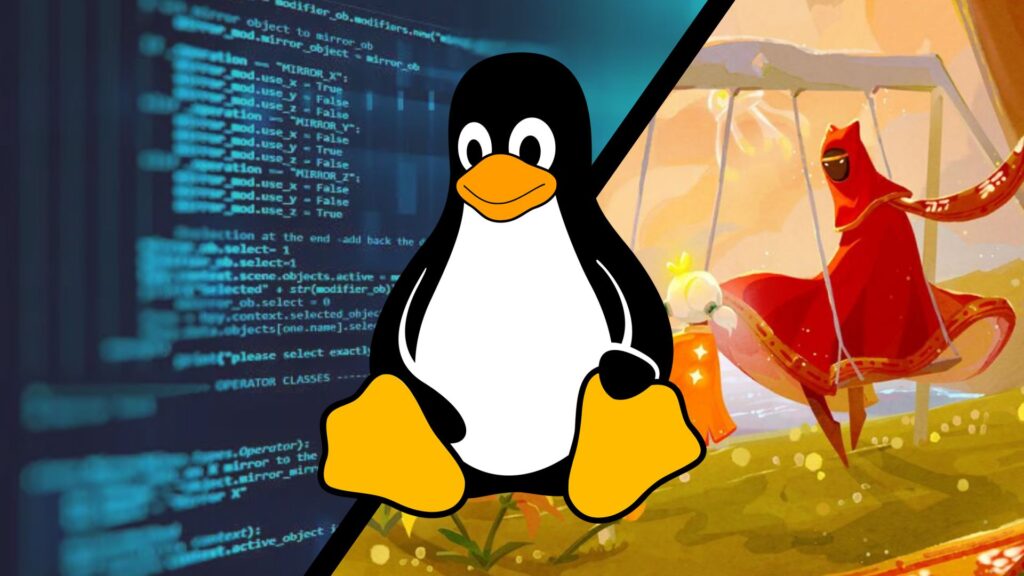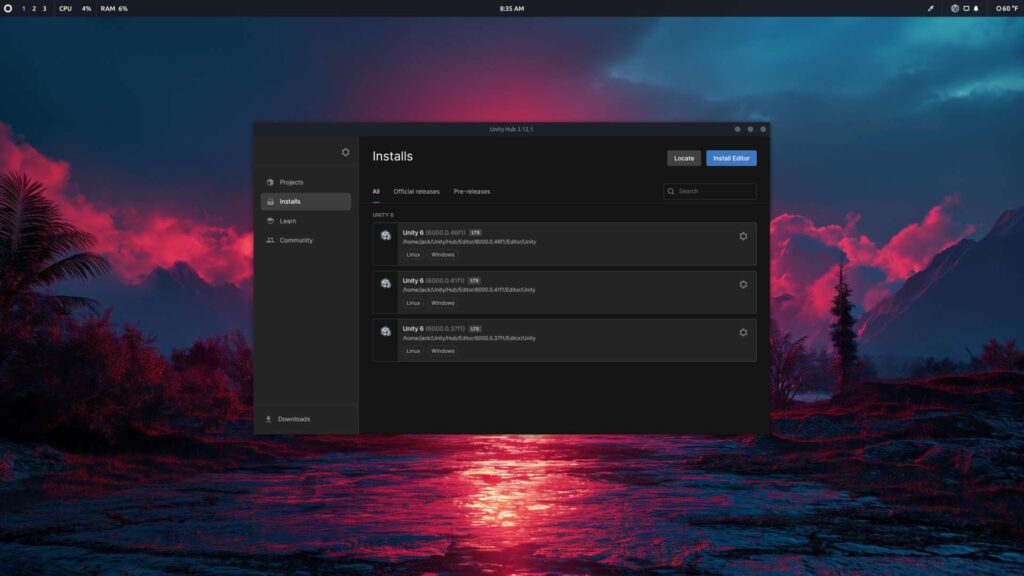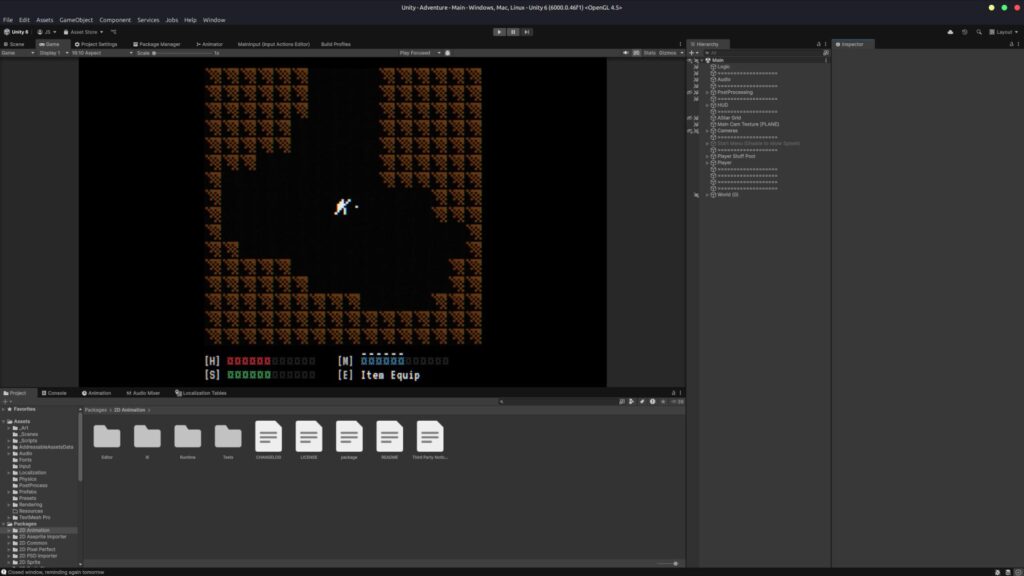Making Games With Linux

So you’re sick and f-ing tired of Microsoft and want to make the switch to Linux but you don’t know what tools are available for game dev? Fear not, developer, I can get you started on development under Linux. It’s not as difficult as you may think! I’ve been maining Linux for some time and developing my games, even Windows executables, on Linux.
Linux has become all the rage these days with Steam’s Hardware Survey coming in with Linux at 2.27% of Steam’s user base at the time of this writing. Steam Deck has been a popular handheld device for PC gamers and enthusiasts and many of you are getting that Linux itch. So where do we start? What engines can we use? There’s Unity, Unreal Engine, Godot, GameMaker and more but today we’ll stick with everyone’s favorite: Unity.
Engines

Unity has been around seemingly forever and it includes a Linux downloadable. That’s right! There’s no tricks, workarounds or gimmicks – just install and you’re off to the races with every major and minor release. Functionally it works exactly as you’d expect if you’re familiar with it on Windows or Mac but with the added benefit of seemingly fewer issues (at least I haven’t had as many on Linux as I do Windows). The Linux version does not come with Visual Studio, but you can simply download Visual Studio Code for Linux, add the Unity, .NET and C# plugins. Once installed navigate to Preferences > External Tools and select Visual Studio Code for your script editor. You’re done.

Note: The Unity editor on Linux has some issues with its UI – the text is incredibly small to read on high DPI displays. There are workarounds to scaling the interface but you cannot scale fractionally so it’s either tiny or brutally large. Thanks, Unity!
Art

Believe it or not, you’re pretty good here, too. Blender, Krita, Aseprite, Inkscape, etc all work flawlessly with native Linux applications. If you’re an Adobe user (you shouldn’t be by now, have some self respect), sadly you’re out of luck. Thankfully applications like Krita and Aseprite are native to Linux and superior programs for painting and pixel art compared to Photoshop. Robust photo editing features will leave you in the dust a little bit if you use a lot of those types of features in Photoshop – there is GIMP and it works, I just find it an absolute slog to use since many of those effects are not using the GPU so they will be a bit slower than real-time while editing.
Bottom Line: You shouldn’t run into many hangups if you decided to dip your toes into not-Adobe products at some point in the last year or two. You will have to learn how to use new tools if you’re a Photoshop diehard, though. Bonus – now you don’t have to pay a subscription fee! With support for Wacom tablets by default in Linux and other tablets like Xencelabs offering native Linux drivers and apps – pen tablets are smooth sailing.
Audio

This is going to be a barrier for a lot of you as this is Linux’s weakest link. Ableton, FL, Reason, etc have no native applications for Linux so we have to look for alternatives. My first (and almost only) recommendation is Reaper. I’ve been using Reaper for years as my go-to DAW, even when I wasn’t using Linux, and Reaper has a native app that is just as light, fast and rock solid as its Mac and Windows counterparts. It has a bit of a learning curve if you’re new to the world of DAWs, but it’s a fantastic DAW across the board.
BitWig is also a contender for DAW aimed at music production with a similar feel to Ableton Live, but it has a hefty price tag compared to Reaper coming in at $450 United States Ameribucks at the time of this writing while Reaper comes in at $60-$225 depending on the license. There are quite a few options that are better suited for different kinds of workflows so just play around with a few and see what suits you best.
Video Editors (for Trailers and Gameplay)

There’s really only one option I recommend across the board: Davinci Resolve. Sure, you’ve got other options like Kdenlive or Shotcut, but nothing compares to Resolve. It can be a bit to setup if you’re on Team Red as you’ll have to make use of OpenCL but if you’re Team Green it’s smooth sailing. What gets me the most is that I have zero issues with Resolve on Linux but on Mac or Windows I would occasionally run into the standard crash. I am not sure who sold their soul at Blackmagic to make Resolve this great on Linux but I am eternally grateful. Bonus: Resolve is free.
Bottom Line
I wish I had more to say but developing games on Linux doesn’t have much friction compared to Windows or Mac so I’m happy to say that for most of us – we’ll do just fine working under Linux. I have worked with many other developers helping them with Unity projects, Godot projects, etc while they were on Windows machines and I had no issues helping them stomp bugs or code features.
Linux has come a long way the past several years and it’s not just a toy for geeks anymore – it has the software to back up its solid foundation. I’ve been maining Linux for a long time and just this past year I nuked my dual boot for good. It might not be for everyone but the ability to control your environment cannot be overstated and the current suite of tools leave me wanting very little aside from a pro-level graphic app alternative to Photoshop like Affinity Photo.